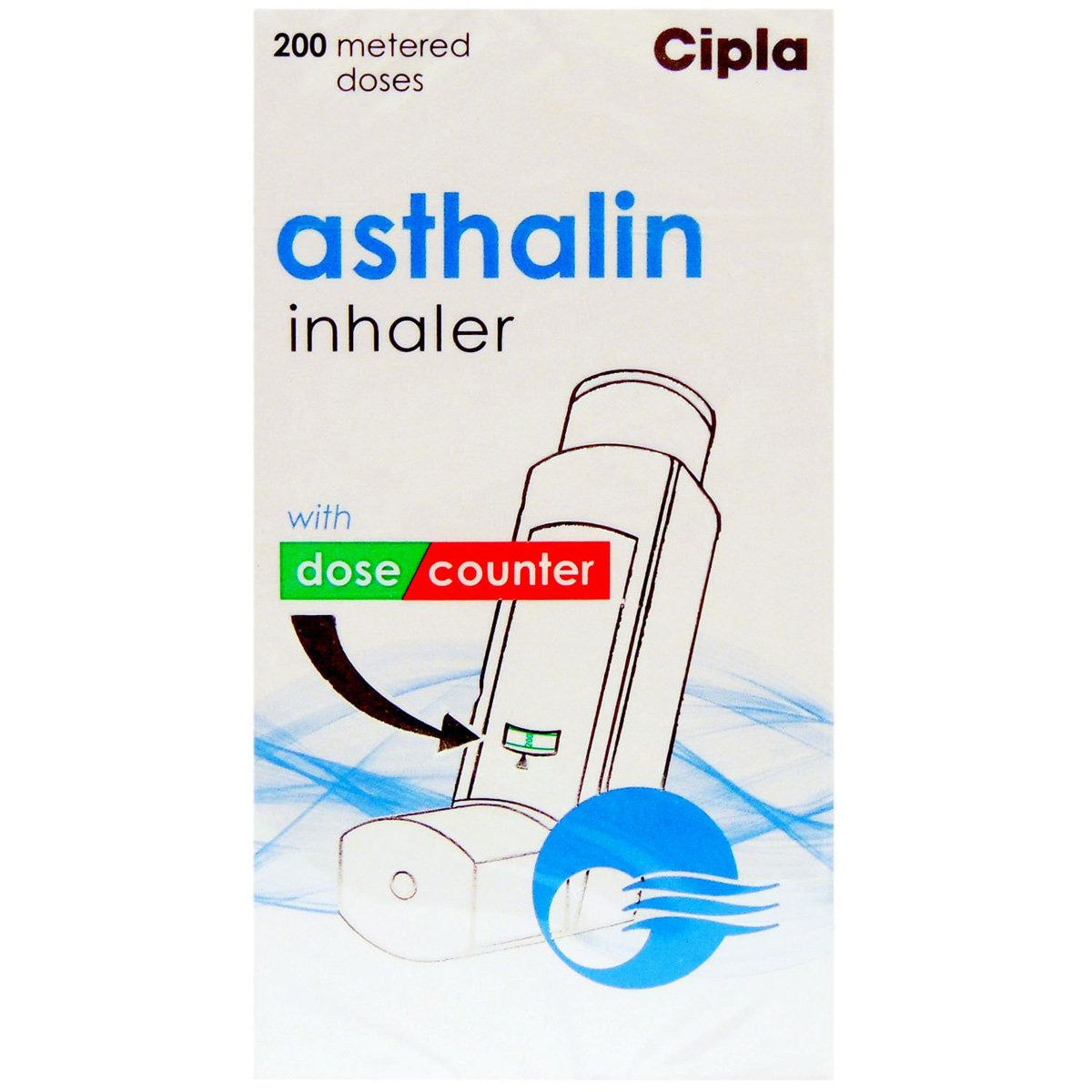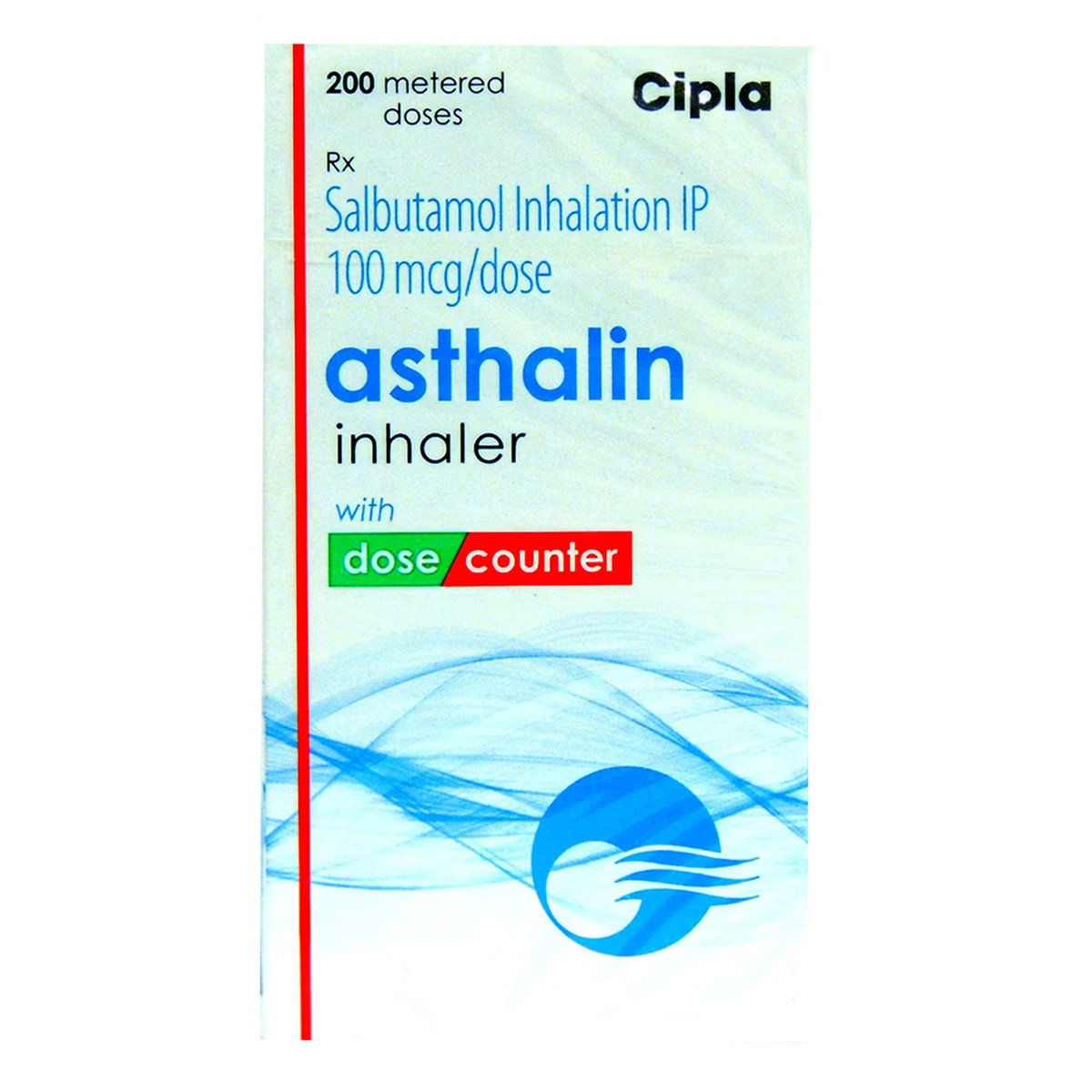Ascoair Inhaler 200 MDI
MRP ₹142
(Inclusive of all Taxes)
₹21.3 Cashback (15%)
Provide Delivery Location
Online payment accepted
 Prescription drug
Prescription drugWhats That
Composition :
Manufacturer/Marketer :
Consume Type :
Expires on or after :
Return Policy :
About Ascoair Inhaler 200 MDI
Ascoair Inhaler 200 MDI belongs to the class of 'bronchodilators' primarily used to treat asthma and chronic obstructive pulmonary disease (COPD). Ascoair Inhaler 200 MDI helps relieve symptoms like coughing, wheezing and shortness of breath. Asthma is a breathing problem in which airways narrow, swell and produce extra mucus, leading to difficulty breathing. COPD is a group of lung diseases with emphysema (shortness of breath) and chronic bronchitis (inflammation of the lining of the bronchial tubes).
Ascoair Inhaler 200 MDI contains 'Salbutamol,' a bronchodilator. It relaxes the muscles in the airways and increases airflow to the lungs. Ascoair Inhaler 200 MDI makes breathing easier by widening the airways. Thereby provides relief from symptoms such as coughing, wheezing and shortness of breath.
Use Ascoair Inhaler 200 MDI as prescribed. Your doctor will advise on how often you need to take Ascoair Inhaler 200 MDI based on your medical condition. The common side effects of Ascoair Inhaler 200 MDI include nausea, vomiting, restlessness, headache, muscle tightness, dryness or soreness of the throat, dizziness, sleepiness, nasal congestion (stuffy nose), and increased heart rate. Most of these side effects of Ascoair Inhaler 200 MDI do not require medical attention and gradually resolve over time. However, if the side effects are persistent, please seek medical help.
Inform your doctor if you have any heart, liver or kidney diseases, hyperthyroidism (overactive thyroid), stomach ulcer, seizure (fits), high blood pressure or diabetes. Ascoair Inhaler 200 MDI may cause a rise in blood sugar levels, hence diabetic patients should monitor their blood glucose levels and use this medicine only with a doctor's advice. Please check with your doctor if you are pregnant, breastfeeding, or taking any other medicines. Avoid drinking alcohol while taking Ascoair Inhaler 200 MDI as it can cause increased sleepiness. Try not to stop taking this medicine on your own.
Uses of Ascoair Inhaler 200 MDI
Directions for Use
Key Benefits
Ascoair Inhaler 200 MDI contains Salbutamol, a bronchodilator. It helps treat respiratory problems like asthma, chronic obstructive pulmonary disease (COPD) and chronic bronchitis. It works by relaxing and widening the lungs' airway, making it easier to breathe, especially in asthma and COPD patients.
Storage
- Notify your doctor immediately if you experience tremors or involuntary shaking after taking medication or adjusting your medication regimen.
- Your doctor may adjust your medication regimen or recommend alternative techniques like relaxation, meditation, or journaling to alleviate tremor symptoms.
- Your doctor may direct you to practice stress-reducing techniques, such as deep breathing exercises, yoga, or journaling.
- Regular physical activity, such as walking or jogging, can help reduce anxiety and alleviate tremor symptoms.
- Your doctor may recommend lifestyle changes, such as avoiding caffeine, getting enough sleep, and staying hydrated, to help manage tremors.
- Maintain regular follow-up appointments with your doctor to monitor tremor symptoms and adjust treatment plans as needed.
- Tell your doctor immediately if you experience symptoms of Nervousness, such as anxiety, jitteriness, or an increased heart rate, after taking medication or adjusting your medication regimen.
- Your doctor may adjust your medication regimen to alleviate symptoms of Nervousness. This can include switching to a different medication, reducing the dosage, or temporarily stopping the medication. Your doctor may also recommend alternative techniques like relaxation, mindfulness meditation, or journaling. These techniques can help reduce anxiety and Nervousness.
- Practice stress-reducing techniques, such as deep breathing exercises, yoga, or journaling, to help manage Nervousness.
- Engage in regular physical activity, such as walking or jogging, to help reduce anxiety and improve mood.
- Your doctor may advise considering cognitive-behavioural therapy (CBT) or other forms of talk therapy to address underlying anxiety or Nervousness.
- You should maintain regular follow-up appointments with your doctor to monitor nervousness symptoms, adjust treatment plans as needed, and discuss any concerns or questions.
- Prepare for a restful night's sleep: Develop a calming pre-sleep routine, like reading or meditation, to help your body relax and prepare for sleep.
- Create a sleep-conducive Environment: Make bedroom a sleep haven by ensuring it is quiet, dark and calm.
- Follow a Sleep Schedule: Go to bed and get up at the same time every day to help regulate your body's internal clock and increase sleep quality.
- Try relaxing techniques like deep breathing, mindfulness meditation and any others.
- Limit stimulating activities before bedtime: Avoid stimulating activities before bedtime to improve sleep quality.
- Monitor Progress: Keep track of your sleep patterns to identify areas for improvement.
- Consult a doctor if needed: If these steps don't improve your sleep, consult a doctor for further guidance and therapy.
- Inform your doctor about the nausea and discuss possible alternatives to the medication or adjustments to the dosage.
- Divide your daily food intake into smaller, more frequent meals to reduce nausea.
- Opt for bland, easily digestible foods like crackers, toast, plain rice, bananas, and applesauce.
- Avoid certain foods that can trigger nausea, such as fatty, greasy, spicy, and smelly foods.
- Drink plenty of fluids, such as water, clear broth, or electrolyte-rich beverages like coconut water or sports drinks.
- Use ginger (tea, ale, or candies) to help relieve nausea.
- Get adequate rest and also avoid strenuous activities that can worsen nausea.
- Talk to your doctor about taking anti-nausea medication if your nausea is severe.
- Record when your nausea occurs, what triggers it, and what provides relief to help you identify patterns and manage your symptoms more effectively.
- Inform your doctor immediately if you experience a fever after starting a new medication.
- Your doctor may adjust your medication regimen or dosage as needed to minimize fever symptoms.
- Monitor your body temperature to monitor fever progression.
- Drink plenty of fluids, such as water or electrolyte-rich beverages, to help your body regulate temperature.
- Get plenty of rest and engage in relaxation techniques, such as deep breathing or meditation, to help manage fever symptoms.
- Under the guidance of your doctor, consider taking medication, such as acetaminophen or ibuprofen, to help reduce fever.
- If your fever is extremely high (over 103°F), or if you experience severe symptoms such as confusion, seizures, or difficulty breathing, seek immediate medical attention.
- Preventing Vomiting (Before it Happens)
- Take medication exactly as prescribed by your doctor. This can help minimize side effects, including vomiting.
- Having a small meal before taking your medication can help reduce nausea and vomiting.
- Talk to your doctor about taking anti-nausea medication along with your prescribed medication.
- Managing Vomiting (If it Happens)
- Try taking ginger in the form of tea, ale, or candy to help alleviate nausea and vomiting.
- What to Do if Vomiting Persists
- Consult your doctor if vomiting continues or worsens, consult the doctor for guidance on adjusting your medication or additional treatment.
- Hydrate your body: Drink enough water to prevent dehydration and headaches.
- Calm Your Mind: Deep breathing and meditation can help you relax and relieve stress.
- Rest and Recharge: Sleep for 7-8 hours to reduce headache triggers.
- Take rest: lie down in a quiet, dark environment.
- Cold or warm compresses can help reduce tension.
- Stay Upright: Maintain good posture to keep symptoms from getting worse.
- To treat headaches naturally, try acupuncture or massage therapy.
- Over-the-counter pain relievers include acetaminophen and ibuprofen.
- Prescription Assistance: Speak with your doctor about more substantial drug alternatives.
- Severe Headaches: Seek emergency medical assistance for sudden, severe headaches.
- Frequent Headaches: If you get reoccurring headaches, consult your doctor.
- Headaches with Symptoms: Seek medical attention if your headaches include fever, disorientation, or weakness.
Drug Warnings
Inform your doctor beforehand if you have any heart, liver, or kidney diseases, hyperthyroidism (overactive thyroid), stomach ulcer, seizure (fits), high blood pressure or diabetes. Ascoair Inhaler 200 MDI may cause hypokalaemia (low potassium levels in the blood) in some patients leading to severe heart diseases, so Ascoair Inhaler 200 MDI should be used cautiously. Let your doctor know if you are pregnant or breastfeeding. Limit alcohol intake since it may worsen the side effects like sleepiness and shakiness.
Drug-Drug Interactions
Drug-Drug Interactions
Login/Sign Up
Coadministration of mifepristone and Ascoair Inhaler 200 MDI can increase the risk of an irregular heart rhythm which can be severe. The risk increases in patients with a history of heart illness or electrolyte imbalance.
How to manage the interaction:
Taking Ascoair Inhaler 200 MDI with mifepristone together is avoided as it can result in an interaction, it can be taken if a doctor has advised it. However, contact a doctor immediately if you experience any symptoms such as dizziness, lightheadedness, fainting, shortness of breath, or irregular heartbeat. Do not discontinue any medications without consulting a doctor.
Using pindolol and Ascoair Inhaler 200 MDI together can increase the risk of narrowing of the airways.
How to manage the interaction:
The combined use of pindolol and Ascoair Inhaler 200 MDI can lead to an interaction, it can be taken if advised by your doctor. However, if you experience Coughing, wheezing, shortness of breath, and high-pitched breathing, contact your doctor immediately. Do not discontinue any medications without consulting a doctor.
Coadministration of Carvedilol and Ascoair Inhaler 200 MDI may reduce the effects of both medications.
How to manage the interaction:
Although there is a possible interaction between Carvedilol and Ascoair Inhaler 200 MDI, they can be taken if your doctor advises. Consult your doctor if you experience shortness of breath, chest pain or any difficulties in breathing. Do not stop using any medications without a doctor's advice.
Coadministration of Penbutolol and Ascoair Inhaler 200 MDI can reduce the effects of both medications and can cause narrowing of the airways.
How to manage the interaction:
Taking Penbutolol and Ascoair Inhaler 200 MDI can lead to an interaction, it can be taken if advised by your doctor. However, if you experience Coughing, wheezing, shortness of breath, and high-pitched breathing, contact your doctor immediately. Do not discontinue any medications without consulting a doctor.
The combined use of Papaverine and Ascoair Inhaler 200 MDI can increase the risk of an irregular heart rhythm which can be severe. The risk increases in patients with a history of heart illness or electrolyte imbalance.
How to manage the interaction:
Co-administration of Papaverine and Ascoair Inhaler 200 MDI can lead to an interaction, it can be taken if advised by your doctor. However, if you experience any symptoms like dizziness, lightheadedness, fainting, shortness of breath, or heart palpitations, consult the doctor immediately. Do not stop using any medications without a doctor's advice.
Co-administration of Salbutaml with Labetalol, the effectiveness of Ascoair Inhaler 200 MDI might be reduced.
How to manage the interaction:
Although taking Labetalol and Ascoair Inhaler 200 MDI together can possibly result in an interaction, it can be taken if a doctor has prescribed it. Do not discontinue any medications without a doctor's advice.
Using levobunolol and Ascoair Inhaler 200 MDI together can reduce the benefits of both drugs and can cause narrowing of the airways.
How to manage the interaction:
The combined use of levobunolol and Ascoair Inhaler 200 MDI can lead to an interaction, it can be taken if advised by your doctor. Don't forget to inform if you have any history of asthma, or severe chronic obstructive pulmonary disease (COPD), consult the doctor immediately. Do not stop using any medications without a doctor's advice.
Co-administration of Ascoair Inhaler 200 MDI with timolol can increase the risk of narrowing of the airways.
How to manage the interaction:
Although taking Ascoair Inhaler 200 MDI and timolol together can possibly result in an interaction, it can be taken if your doctor has advised it. However, if you experience Coughing, wheezing, shortness of breath, and high-pitched breathing, contact your doctor immediately. Do not discontinue any medications without consulting a doctor.
Using propranolol and Ascoair Inhaler 200 MDI together can reduce the effects or increase the risk of narrowing of the airways.
How to manage the interaction:
The combined use of propranolol and Ascoair Inhaler 200 MDI can lead to an interaction, but they can be taken if advised by your doctor. However, if you experience any unusual symptoms contact your doctor immediately. Do not stop using any medications without first talking to your doctor.
Drug-Food Interactions
Drug-Food Interactions
Login/Sign Up
Diet & Lifestyle Advise
- Know your triggers like allergens, such as pollen, dust and food items that make your asthma severe.
- Quit smoking and avoid passive smoking. Smoking also reduces the effectiveness of Ascoair Inhaler 200 MDI.
- Eat a healthy diet and exercise regularly to strengthen your breathing muscles and boost your immune system.
- Learning breathing exercises will help you move more air in and out of your lungs.
Side Effects of Ascoair Inhaler 200 MDI
- Nausea
- Vomiting
- Restlessness
- Headache
- Muscle tightness
- Dryness or soreness of the throat
- Dizziness
- Sleepiness
- Nasal congestion (stuffy nose)
Habit Forming
Therapeutic Class
All Substitutes & Brand Comparisons
RX
Asthalin 100 mcg Inhaler 200 Mdi
Cipla Ltd
₹168.5
(₹0.76/ 1MDI)
18% COSTLIERRX
Asthalin 100 mcg Inhaler 200 mdi
Cipla Ltd
₹168.5
(₹0.76/ 1MDI)
18% COSTLIERRX
Out of StockVentorlin Inhaler CFC Free
GlaxoSmithKline Pharmaceuticals Ltd
₹80.64
(₹72.58 per unit)
11240% COSTLIER
Author Details
We provide you with authentic, trustworthy and relevant information
Drug-Diseases Interactions
Drug-Diseases Interactions
Login/Sign Up
FAQs
Ascoair Inhaler 200 MDI works by relaxing the muscles in the airways and increasing airflow to the lungs.
Ascoair Inhaler 200 MDI should be cautiously used only under a doctor's supervision if you have any heart, liver, kidney diseases, hypokalaemia (low potassium levels), hyperthyroidism (overactive thyroid), stomach ulcer, seizure (fits), high blood pressure, or diabetes.
Ascoair Inhaler 200 MDI can cause a rise in blood glucose levels. Hence monitor your blood glucose levels if you have diabetes and inform your doctor so that the dose can be adjusted accordingly.
Bronchodilators may cause central nervous system stimulation. Hence Ascoair Inhaler 200 MDI is recommended to be used with caution in patients with seizures as it might worsen your condition. Please consult your doctor if you have any concerns.
Ascoair Inhaler 200 MDI can cause hypokalaemia in some patients leading to cardiovascular effects. Please consult your doctor before taking Ascoair Inhaler 200 MDI if you are a hypokalaemia patient.
Drug-Drug Interactions Checker List
- PROPRANOLOL
- CLOMIPRAMINE
- GUANETHIDINE
- METHYLDOPA
- DIAZEPAM
- LORAZEPAM
- TICLOPIDINE
- ALLOPURINOL
- VERAPAMIL
- OESTROGEN
- PROGESTERONE
- PHENOBARBITAL
- PHENYTOIN
- CIMETIDINE
Special Advise
- Monitor your blood glucose levels regularly since bronchodilators can raise blood sugar levels.
Disease/Condition Glossary
Asthma: It is a condition in which airways narrow, swell and may produce extra mucus which may lead to breathing difficulty and trigger cough, a whistling sound (wheezing) when you breathe out and shortness of breath.
Chronic obstructive pulmonary disease (COPD): It is a group of progressive lung diseases, most commonly emphysema (shortness of breath) and chronic bronchitis (inflammation and irritation of bronchial tubes). Initially, it may be mild, but in severe cases, it can lead to total blockage of airways and damage the lungs.

Have a query?
Alcohol
Safe if prescribed
You are recommended not to consume alcohol along with Ascoair Inhaler 200 MDI to avoid unpleasant side-effects like drowsiness, dizziness, or sleepiness.
Pregnancy
Consult your doctor
Please consult your doctor if you are planning to become pregnant or already pregnant before starting Ascoair Inhaler 200 MDI.
Breast Feeding
Consult your doctor
There is limited data on how Ascoair Inhaler 200 MDI affects breastfeeding. Please consult your doctor before starting Ascoair Inhaler 200 MDI.
Driving
Safe if prescribed
Ascoair Inhaler 200 MDI usually causes dizziness, drowsiness, muscle cramps and visual disturbances, which may affect the ability to drive or operate machinery. So, do not drive or operate heavy machinery if you feel sleepy or dizzy after taking Ascoair Inhaler 200 MDI.
Liver
Consult your doctor
Ascoair Inhaler 200 MDI should be used with caution in patients with liver diseases. Let your doctor know if you have any history of liver diseases or hepatic impairment. Your doctor will weigh the benefits and potential risks before prescribing Ascoair Inhaler 200 MDI.
Kidney
Consult your doctor
Ascoair Inhaler 200 MDI should be used with caution in patients with kidney diseases. Let your doctor know if you have any history of kidney diseases. Your doctor will weigh the benefits and potential risks before prescribing Ascoair Inhaler 200 MDI.
Children
Safe if prescribed
Ascoair Inhaler 200 MDI is not recommended for children under two years of age. However, it can be given to children above two years of age only if the doctor has prescribed it.










